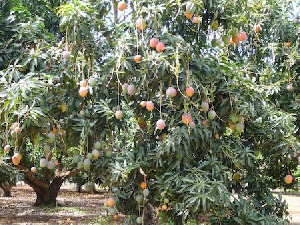Production figures of mango are expected to dip significantly by the end of the year, as the unpredictable rainfall pattern has affected farm produce due to what the farmers call ‘flower abortion’.
A number of mango farmers say flower abortion, which is a situation where the pollen grains of the flower are washed away by continuous rainfall, has caused them to lose their harvest and put them in a dire situation to meet market demands.
Already, the situation has forced one of the country’s biggest fruit-juice producers, Blue Skies Ghana, to turn to imported mango fruit from Brazil to feed its production plants.
Peter Sackey, the Chairman of the Yilo Krobo Mango Farmers Association, one of the largest mango-producing entities in the country, told B&FT that the major problem of Association members now is the fruit abortion that occurs during the rainy season.
"We need the rain, but timing of the rain is not the best. The effect of the rain on our fruit is unprecedented because the rain was continuous, so all our flowers were aborted.
"Less than one percent of farmers had a different story to tell. So now my fruit available are very small and the buyers are worried because they want the fruit to buy."
The visibly worried Mr. Sackey, who said he harvested close to 150 tonnes last year but could now harvest possibly less than 50 tonnes.
He added: "Meanwhile, I have workers who have to be paid so really this is a difficult moment for us. We need the rain but we need it at the right time, and this time around we are getting it at the wrong time.
"If we could predict when the rain will be coming then we could also adjust the time when we do the flower induction.”
Ernest Ablorh, an agronomist at Blue Skies Ghana Limited, producer of fresh fruit juice, said for the past nine weeks the company has been importing mangoes from Brazil at a huge cost since it is not getting enough supply from local farmers.
"If there are no mangoes then we will be forced to import mango from outside the country. Since we can't stop production, we sometimes have to airlift mangoes just to meet our customer-demand.
"It is very expensive to import the mangoes, and for the past nine weeks we have been importing them from Brazil to Ghana on chartered flights," he said.
Mango as a tropical fruit does well during the dry season, and unexpected rainfall causes mangoes to lose the flowers needed to aid in pollination.
Mango in Ghana is targetted as the next non-traditional export crop expected to earn significant foreign exchange by maximising exports.
Current national mango production output figures are not readily available, but the most recent from the Ministry of Food and Agriculture show that mango exports went up from less than 500 metric tonnes in 2006 to more than 1,000 metric tonnes in 2008.
In 2010 government through EDAIF launched a GH?52million Mango Plantation project in five regions, which is aimed at developing a mango orchard over a five-year period with an output target of 89,000 metric tonnes.
However, the production trend and challenges of the farmers show that the production output target is way out of range, as they are even unable to meet demand of local buyers as a result of fruit abortion.
The presence of fresh mangoes from Ghana on the international markets is relatively modest, amounting to less than 3 percent of EU imports in terms of volumes supplied from ECOWAS countries.
In terms of supplier importance, Ghanaian mangoes were ranked 25th in 2011 in terms of volume, far behind Cote d’Ivoire (5th position) and Senegal (9th).
Mango farmers led by the Yilo Krobo Mango Farmers Association have therefore appealed to state authorities, particularly Ghana Meteorological Service, to deepen their relationships with farmer-based associations in order to provide information that will aid farmers in their decision-making.
The provision of meterological forecasts on weekly, monthly and quarterly basis and made available to the mango industry -- particularly during key phases of the mango season -- according to some farmers who spoke to B&FT, will go a long way to help them to know when to do the flower induction.
The farmers added that a network of competent agents are required to strengthen technical support to the production base as well as address production issues -- such as pest, disease and quality -- which contribute to low yields and undermine the profitability of farmers.
Business News of Monday, 8 December 2014
Source: B&FT

















